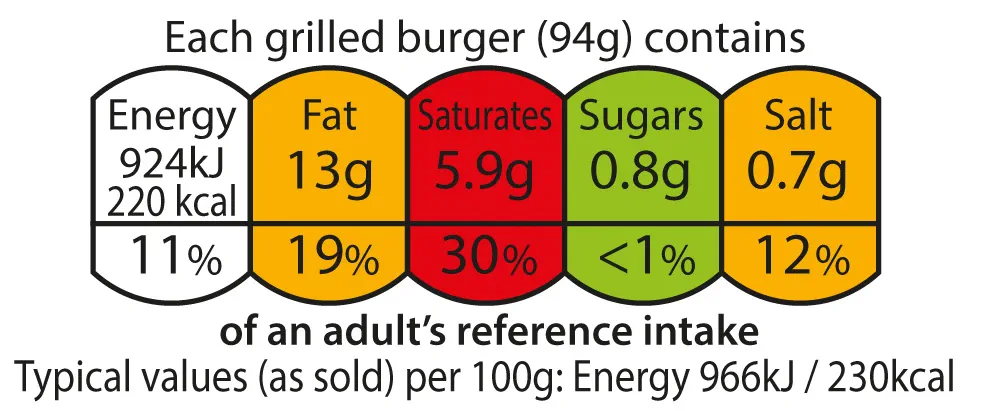The truth about ready meals
After a long and tiring day, a ready meal might be more appealing than preparing a meal from scratch. After all – ready meals are quick and easy. But do they provide you with the nutrients your body needs for good health? Here, I explain what you need to know about ready meals and share my tips for keeping them as healthy as possible.

Are ready meals bad for you?
Did you know that in the UK, two in five adults eat ready meals every week?
There are many reasons why you might choose a ready meal over a home-cooked one:
- You’re busy and don’t have much time to cook
- you live on your own and don’t enjoy cooking
- you aren’t confident in the kitchen
Even though ready meals can be convenient, they may not be a nutritious and balanced choice. Some ready meals can be high in salt and fat. Regularly eating these meals can increase your risk of health issues such as cardiovascular disease, high blood pressure and diabetes.
Are some ready meals healthier than others?
Many supermarkets and food companies now have their own range of ‘healthier’ ready meals as an alternative to traditional ready meals. These may be lower in calories, fat, salt and sugar, but are also still likely to be low in other important nutrients.
Some supermarkets also have a premium range of their own-brand ready meals.
While these may taste better, they might not be any better for your health. In fact, a few studies have found that premium supermarket ready meals tend to be higher in calories, fat and salt than ‘value’ ready meals.
How to make ready meals healthier
Get to know your labels
In the UK, a traffic light food labelling system is used on the front of some food packaging.
This shows you the nutritional content of different foods, so you can make healthier choices. It lists the amount of:
- calories
- fat
- sugar
- salt
These are categorised as either red, amber or green. This helps you see whether a food or drink is healthy.
- Green = a good choice
- Amber = eat occasionally
- Red = try to avoid

Sometimes the traffic light system isn’t helpful. For example, it might list oily fish as red under the fat section, but this contains healthy omega 3 fats that are essential for health. So be mindful when making your choices.
The ingredients list on the back of the pack lists ingredients in order of quantity. Checking the top three ingredients shows you what the majority of the product is made up of.
So, if fat, salt, and sugar are listed high up in the ingredients, this means that the product is made up mostly of these ingredients. It is important to check that the nutritional information relates to the serving size you’re going to eat.
For example, the label may display calories per 100g, but the product might weigh 120g. So double check the portion you’ll actually be eating and adjust your calculations if you need to.
Add a side of vegetables or salad
One of the easiest ways to make a ready meal healthier is to include at least one portion of fresh vegetables or salad. This could be fresh, frozen, or tinned items, such as salad leaves, frozen peas or tinned sweetcorn. You could also have a portion of fresh fruit to have for dessert.
This will help to boost the nutritional content of a ready meal by increasing your vitamin and mineral intake. It will also help you to reach your minimum target of 5 portions of fruit and vegetables per day.
Other top tips
- choose ready meals with vegetables included
- limit processed meat and choose chicken, fish, or seafood
- opt for ready meals with sources of fibre, such as legumes and beans
Quick and easy healthy meal ideas
Cooking a healthy meal may take less time than you think. The internet is packed with lots of quick and easy nutritious recipes, and can be a great source of cooking inspiration for mealtimes.
Choose meals that don’t need lots of ingredients and keep it simple by using frozen or pre-chopped vegetables.
Or try batch cooking so you can keep leftovers in the fridge or freezer, which will help you to make an easy and nutritious meal another day.
There are also lots of helpful tips online for eating healthily if you don’t like cooking, or don’t feel in the mood to cook.
Do you know how healthy you truly are? Bupa health assessments give you a clear overview of your health and a view of any future health risks. You'll receive a personal lifestyle action plan with health goals to reach for a happier, healthier you.
-
Sources Sources
- Foods and drinks high in fat, salt and sugars. British Nutrition Foundation. nutrition.org, accessed February 2025
- Fruit and vegetables – how to get five-a-day. The Association of UK Dietitians. bda.uk.com, accessed February 2025
- Food labelling: nutrition information. The Association of UK Dietitians. bda.uk.com,accessed February 2025. https://www.bda.uk.com/resource/food-labelling-nutrition-information.html
- Healthy eating and drinking (including management of obesity). Diabetes Care: A Practical Manual. Oxford Medicine Online. Oxfordmedicine.com, accessed February 2025
- Ready meals 2020 snapshot survey. Eating better.eatingbetter.org, published July 2020. https://www.eating-better.org/uploads/Documents/2019/ready-meal-survey-final.pdf
- Howard S, Adams J & White M. Nutritional content of supermarket ready meals and recipes by television chefs in the United Kingdom: cross sectional study. BMJ 2021; 345. doi: 10.1136/bmj.e7607
- Remnant J & Adams J. The nutritional content and cost of supermarket ready-meals. Cross-sectional analysis. Appetite 92; 36-42. doi.org/10.1016/j.appet.2015.04.069
- Celnik D, Gillespie L & Lean MEJ. Time-scarcity, ready-meals, ill health and the obesity epidemic. Trends in Food Science & Technology 2012; 27(1):4-11
- Ultra-processed food intake and risk of cardiovascular disease: prospective cohort study (NutriNet-Santé). BMJ .bmj.com, published 2019
- An analysis of the nutritional value of UK supermarket ready meals. Proceedings of the Nutrition Society (2020), 79 (OCE3), E794. doi:10.1017/S0029665120007806
About our health information
At Bupa we produce a wealth of free health information for you and your family. This is because we believe that trustworthy information is essential in helping you make better decisions about your health and wellbeing.
Our information has been awarded the PIF TICK for trustworthy health information. It also follows the principles of the The Information Standard.

More diet and nutrition articles
Did you find our advice helpful?
We’d love to hear what you think. Our short survey takes just a few minutes to complete and helps us to keep improving our healthy lifestyle articles.
Legal disclaimer
This information was published by Bupa's Health Content Team and is based on reputable sources of medical evidence. It has been reviewed by appropriate medical or clinical professionals and deemed accurate on the date of review. Photos are only for illustrative purposes and do not reflect every presentation of a condition.
Any information about a treatment or procedure is generic, and does not necessarily describe that treatment or procedure as delivered by Bupa or its associated providers.
The information contained on this page and in any third party websites referred to on this page is not intended nor implied to be a substitute for professional medical advice nor is it intended to be for medical diagnosis or treatment. Third party websites are not owned or controlled by Bupa and any individual may be able to access and post messages on them. Bupa is not responsible for the content or availability of these third party websites. We do not accept advertising on this page.







